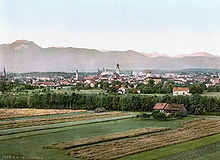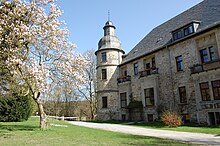Friedrich Ernst of Saxe-Altenburg
Friedrich Ernst Karl August Adalbert Prince of Saxony-Altenburg (born May 15, 1905 in Potsdam , † February 23, 1985 in Rosenheim ) was Prince of the House of Saxony-Altenburg . He was a historian and archaeologist .
Family and life
Prince Friedrich Ernst, known as Prince Suddenly , was born as the fourth and youngest child of the then Prince and later Duke Ernst II of Saxony-Altenburg and his wife, Duchess Adelheid (born Princess zu Schaumburg-Lippe ). His father was the last ruling duke of the Duchy of Saxony-Altenburg . The older brother Georg Moritz (1900–1991) was a supporter and promoter of anthroposophy and the last Hereditary Prince of the House of Saxony-Altenburg.
After school and high school in Dresden , Friedrich Ernst studied history and archeology, mainly in Jena and Marburg . Studies in English , Greek , art history and psychology in various places at home and abroad followed. His later excavation work was remarkable: on the Byzantine imperial palaces in Constantinople , but especially the research in Mexico and Venezuela on the Zapotec , Aztec and Toltecs .
In 1926 he became a member of the Anthroposophical Society . In July 1926 Friedrich Ernst traveled to Flanders and Brabant and visited places of art and culture as well as the battlefields in Flanders. In the following two months Friedrich Ernst traveled through Switzerland .
Friedrich Ernst received his military training in 1935 and 1936. He was drafted into the Wehrmacht at the end of 1935 and took part in two reserve officer candidate courses. In the years 1939 to 1945 - Friedrich Ernst was not drafted into the army because of a malaria illness that he contracted in Costa Rica - he implemented the knowledge he acquired during his excavations and gave lectures on cultural history in units of the Air Force and in Air Force hospitals. The main titles of these lectures were: The Mexican Cultures , Arab Cultures , The Medieval Knight Orders , Britain in the Occidental Region , The German-English Cultural Relationships Through The Ages .
In an effort to establish a permanent sphere of activity, Friedrich Ernst helped out as a history and English teacher at the Stuttgart Waldorf School from October 1949 and made a lasting impression on the students with his enthusiasm and lively representations. In the Altenwerk in Hamborn Castle , where his brother Georg Moritz lived, he gave lectures on the life of St. Elisabeth, among other things, and also helped there with classes at the Rudolf Steiner School.
death
Friedrich Ernst von Sachsen-Altenburg died on February 23, 1985 in Rosenheim. He was 79 years old. His energies and interests knew no bounds. He was a charming, alert man of the world and a lovable “whirlwind”, which his close friends and relatives called “Fritz the Sudden” because he could often appear or disappear suddenly. Every conversation with him was a gain and also showed his wide-ranging education and humanity. The news of the death of the researcher Prince Friedrich Ernst von Sachsen-Altenburg received appropriate attention not only in Germany, the English and French press also knew about it.
literature
- Uwe Gillmeister: From the throne to the dog. Borna 2003, ISBN 3-937287-01-9
- Ulrich Hess: History of Thuringia 1866 to 1914. Weimar 1991, ISBN 3-7400-0077-5
- Uwe Werner: Anthroposophists in the time of National Socialism (1933-1945). Munich 1999, ISBN 3-486-56362-9
Web links
- Research Center Kulturimpuls - Biographies Documentation
- Grand Duke incognito . Der Spiegel 7/1961
- The good fat dairy cow . The mirror 19/1956
- Duke Ernst II and Prince Friedrich Ernst of Sachsen-Altenburg and the dark count research ( Memento from July 28, 2014 in the Internet Archive )
Individual evidence
- ↑ Uwe Gillmeister: From the throne to the dog. Borna 2003, p. 158.
- ↑ Uwe Gillmeister, op.cit., P. 159.
- ↑ Uwe Gillmeister, op.cit., P. 160.
- ↑ Research Center for Culture Impulse - Biographies Documentation .
- ↑ Uwe Gillmeister: From the throne to the dog. Borna 2003, p. 163.
| personal data | |
|---|---|
| SURNAME | Sachsen-Altenburg, Friedrich Ernst von |
| ALTERNATIVE NAMES | Saxony-Altenburg, Friedrich Ernst Karl August Adalbert von (full name) |
| BRIEF DESCRIPTION | German historian and archaeologist |
| DATE OF BIRTH | May 15, 1905 |
| PLACE OF BIRTH | Potsdam , Germany |
| DATE OF DEATH | February 23, 1985 |
| Place of death | Rosenheim , Germany |


